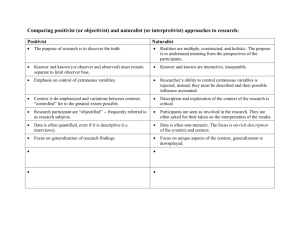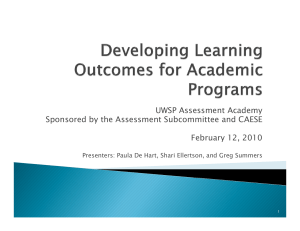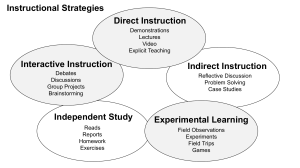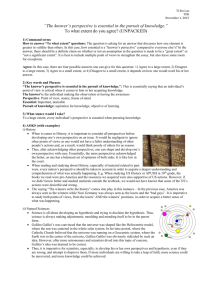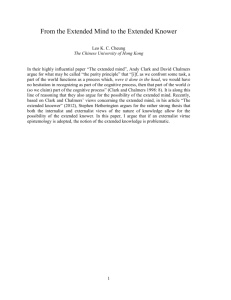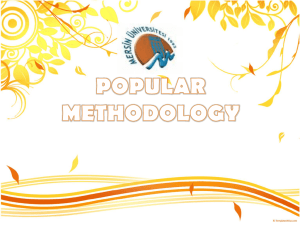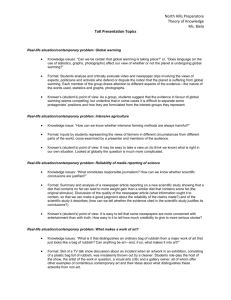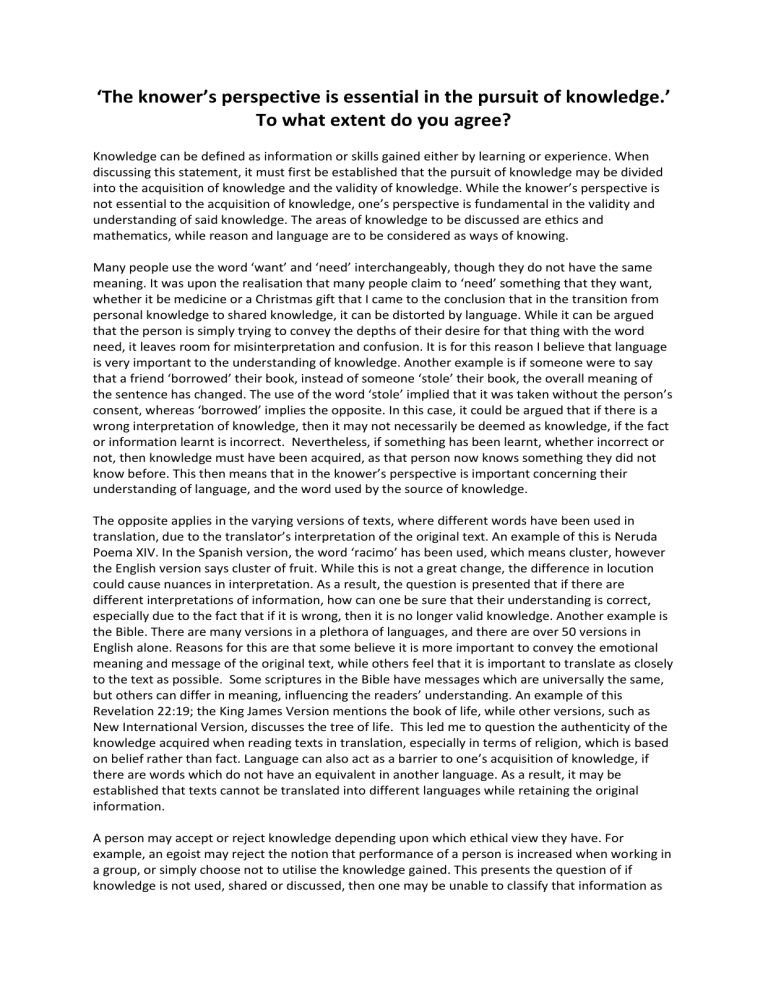
‘The knower’s perspective is essential in the pursuit of knowledge.’ To what extent do you agree? Knowledge can be defined as information or skills gained either by learning or experience. When discussing this statement, it must first be established that the pursuit of knowledge may be divided into the acquisition of knowledge and the validity of knowledge. While the knower’s perspective is not essential to the acquisition of knowledge, one’s perspective is fundamental in the validity and understanding of said knowledge. The areas of knowledge to be discussed are ethics and mathematics, while reason and language are to be considered as ways of knowing. Many people use the word ‘want’ and ‘need’ interchangeably, though they do not have the same meaning. It was upon the realisation that many people claim to ‘need’ something that they want, whether it be medicine or a Christmas gift that I came to the conclusion that in the transition from personal knowledge to shared knowledge, it can be distorted by language. While it can be argued that the person is simply trying to convey the depths of their desire for that thing with the word need, it leaves room for misinterpretation and confusion. It is for this reason I believe that language is very important to the understanding of knowledge. Another example is if someone were to say that a friend ‘borrowed’ their book, instead of someone ‘stole’ their book, the overall meaning of the sentence has changed. The use of the word ‘stole’ implied that it was taken without the person’s consent, whereas ‘borrowed’ implies the opposite. In this case, it could be argued that if there is a wrong interpretation of knowledge, then it may not necessarily be deemed as knowledge, if the fact or information learnt is incorrect. Nevertheless, if something has been learnt, whether incorrect or not, then knowledge must have been acquired, as that person now knows something they did not know before. This then means that in the knower’s perspective is important concerning their understanding of language, and the word used by the source of knowledge. The opposite applies in the varying versions of texts, where different words have been used in translation, due to the translator’s interpretation of the original text. An example of this is Neruda Poema XIV. In the Spanish version, the word ‘racimo’ has been used, which means cluster, however the English version says cluster of fruit. While this is not a great change, the difference in locution could cause nuances in interpretation. As a result, the question is presented that if there are different interpretations of information, how can one be sure that their understanding is correct, especially due to the fact that if it is wrong, then it is no longer valid knowledge. Another example is the Bible. There are many versions in a plethora of languages, and there are over 50 versions in English alone. Reasons for this are that some believe it is more important to convey the emotional meaning and message of the original text, while others feel that it is important to translate as closely to the text as possible. Some scriptures in the Bible have messages which are universally the same, but others can differ in meaning, influencing the readers’ understanding. An example of this Revelation 22:19; the King James Version mentions the book of life, while other versions, such as New International Version, discusses the tree of life. This led me to question the authenticity of the knowledge acquired when reading texts in translation, especially in terms of religion, which is based on belief rather than fact. Language can also act as a barrier to one’s acquisition of knowledge, if there are words which do not have an equivalent in another language. As a result, it may be established that texts cannot be translated into different languages while retaining the original information. A person may accept or reject knowledge depending upon which ethical view they have. For example, an egoist may reject the notion that performance of a person is increased when working in a group, or simply choose not to utilise the knowledge gained. This presents the question of if knowledge is not used, shared or discussed, then one may be unable to classify that information as knowledge at all, or the value of said knowledge may be greatly diminished. Nevertheless, it is rare that one person will be completely inclined to one ethical view, and it is more likely that they will accept or reject knowledge depending on the information and statistics used as evidence. Religious ethics can also alter the knower's validity of knowledge as certain people may accept or reject theories according to what they choose to believe. For example, a religious person or agnostic will believe in the existence of a deity, and hence they will accept knowledge which supports this, while rejecting other information that indicates otherwise. Additionally, due to a person’s religious views, they may choose to interpret the knowledge differently, for example a Muslim may support the Big Bang theory, on the premise that it is Allah who created the Big Bang, rather than just a spontaneous reaction. As the information has been slightly distorted by the perception of the knower, it may be argued the information gathered is no longer valid knowledge, as there is no proof to the claim made. In contrast, in the area of mathematics, the knower’s perspective in both acquisition and validity of knowledge is unimportant, as the answers gained are more objective through the use of reason. When calculating equations, rules has been established which must be adhered to, otherwise the answer gained is incorrect. As there is a clear identification of what is right and wrong in the world of mathematics, it is easier to say whether knowledge has been acquired or not, and whether it is valid. Maths is considered to be a language to some, and as this is a language which is universally the same all over the world, all answers deduced through mathematics are the same regardless of the knower’s perspective. If maths is a language, this it can then be said that the knower’s perspective is not always important in the pursuit of knowledge, if the knowledge is not translated. This is also dependent upon which language is used, as maths does not require the knower’s perspective, while other languages do, due to word choice, which could influence understanding. Reason. To conclude, the knower’s perspective in not necessarily essential to the pursuit of knowledge, and the extent of its importance is dependent upon the areas of knowledge being considered. For example, in terms of ethics, the knower’s perspective is paramount, while in mathematics, it is irrelevant. Additionally, the ways of knowing must also be considered, as reason is more objective, and the clear definition between right and wrong causes the knower’s perspective to be irrelevant in their pursuit. However, in regards to language, both the perspective of the knower and the source of information are important, as the choice of words can cause nuances in meaning, especially when translating texts. While some may actually pursue knowledge, a lot of knowledge can be gained without actively seeking it. For example, people gain knowledge from life experiences, but they do not act with the intention of acquiring knowledge, and hence the knower’s perspective is no longer essential, as the knowledge has been gained, albeit unwillingly. This then means that if a knower’s perspective were to somehow limit or adversely affect one’s pursuit of knowledge, it is not significant, as knowledge is still being acquired and validated. This then poses the question ‘is the pursuit of knowledge important if knowledge is still acquired?’ and it could be argued that it is not, as the acquisition is more important than the pursuit; if one is pursuing knowledge but proves unsuccessful, then surely the unconscious acquisition of knowledge is better, as knowledge has been gained? It may then be concluded that the knower’s perspective is not important, https://www.goconqr.com/en/p/3529510--the-knower-s-perspective-is-essential-in-the-pursuit-ofknowledge---to-what-extent-do-you-agree-with-this-statement--mind_maps
